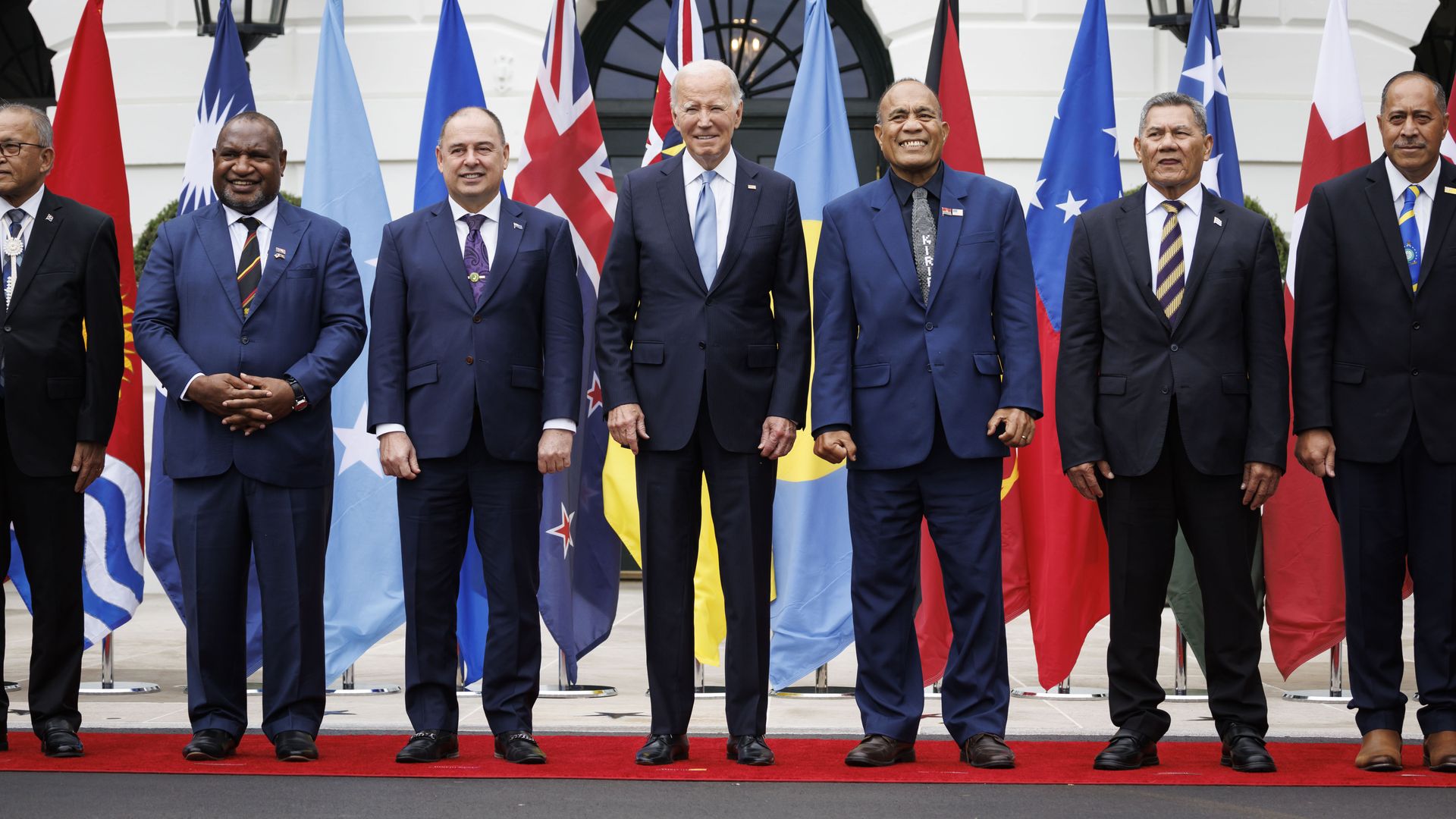
President Biden with Pacific Islands Forum leaders at the White House on Sept. 25. Photo: Ting Shen/Bloomberg via Getty Images
Leaders from more than a dozen Pacific island nations visited Washington this week for a forum intended to underscore America's commitment to the region — even as key agreements set to expire this weekend have not yet been renewed.
Why it matters: After decades of disinterest, the U.S. is trying to reengage with the Pacific Islands region just as it has become an epicenter of U.S.-China competition, with both superpowers courting the tiny island nations for access to waterways and landing strips.
- If the U.S. doesn't renew agreements with three of the island nations, "we severely risk our credibility vis-à-vis the region and obviously vis-à-vis what we are saying on competing with China," Joseph Yun, the envoy leading U.S. negotiations with the three Pacific island nations told the WSJ.
Driving the news: The two-day summit at the White House — the second in just under a year — saw an expansion of U.S. diplomatic and development commitments in the region.
- President Biden promised the leaders an additional $200 million in funding to help fight climate change and grow local economies, though the money has not yet been approved by Congress. He also said the U.S. would establish diplomatic relations with the Cook Islands and Niue and open embassies there, and that the U.S. aims to open an embassy in Vanuatu next year.
- The prime minister of the Solomon Islands, who last year signed a security pact with Beijing, skipped the summit and last week praised China's development assistance as "less restrictive, more responsive and aligned to our national needs." Vanuatu's leader also skipped the meeting.
Beijing, meanwhile, is highlighting the strategic nature of America's motivation for courting leaders in the region. "The Pacific island countries were largely forgotten by the West," the state-run China Daily wrote in an editorial on Monday.
- "They had not been back on the Western radar until very recently, when the United States and its allies started viewing China as a rival. All of a sudden, the region has become an area of interest on their geopolitical chessboard."
Between the lines: "For the United States, countering China in the region is driving its renewed engagement with the Pacific Islands. For the Pacific islands, the current moment offers a chance to advance its goals on climate change, fishing rights, sustainable development and regional cohesion," Charles Edel, Australia chair at the Center for Strategic and International Studies, told Axios.
- "This convergence of interests could prove mutually beneficial to both the United States and the Pacific Islands and serve as an effective counterweight to Chinese investment and influence in the region," Edel said.
Yes, but: The chaos and uncertainty of the looming U.S. government shutdown for two of America's closest partners in the Pacific comes just as Biden is attempting to make the case the U.S. is a more reliable partner than China.
- The summit took place just days before 20-year agreements with the Federated States of Micronesia and the Marshall Islands are due to expire on Oct. 1.
- That's also the deadline for the U.S. to pass its budget and avoid a government shutdown that could freeze the renewal process, pushing it past the expiration date.
Details: The U.S. provides hundreds of millions in funding to those two countries, along with Palau, grants access to certain U.S. government programs, and allows their citizens to live, work and study in the U.S. without visas. Those agreements are renewed every two decades.
- Meanwhile, the U.S. gets unimpeded access to the countries' strategically located waters and airways in perpetuity.
- "We are deeply aware of the stakes and the challenges and we're doing everything possible in our negotiations with island nations to conclude a strong deal as quickly as possible," a senior U.S. official told reporters over the weekend.
- The Marshall Islands and Micronesia did not respond to requests for comment.
State of play: Negotiations with the Marshall Islands have come down to the wire due in part to the contentious issue of compensation for families affected by U.S. nuclear tests at Bikini Atoll in the 1940s and 1950s.
- The U.S. and Micronesia reached an agreement on funding levels in May. Palau, which doesn't face a funding cliff until next year, has also agreed to a top-line number.
- The Biden administration budgeted $7.1 billion over 20 years for the three countries — a sharp increase in funding that reflects the growing value the U.S. places on the region due to competition with China.
- All three deals still have to be approved by Congress. Despite bipartisan support and the looming deadlines, that has yet to happen.
The big picture: The top concern shared by Pacific Island nations is climate change, not geopolitics. Biden has pledged to help the countries adapt to climate change and improve their communications infrastructure.
- In a joint statement on Monday, the gathered leaders of the island nations called climate change the "single greatest existential threat" facing the Pacific.
- At a summit in Vanuatu in August, China pledged additional support to the region to fight climate change.

